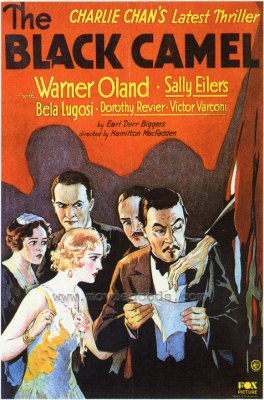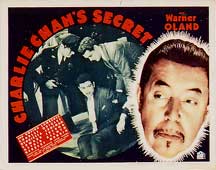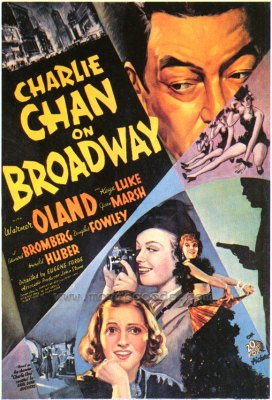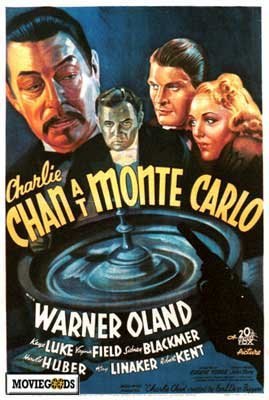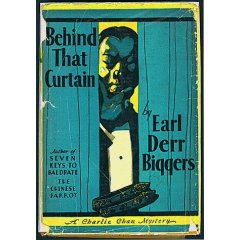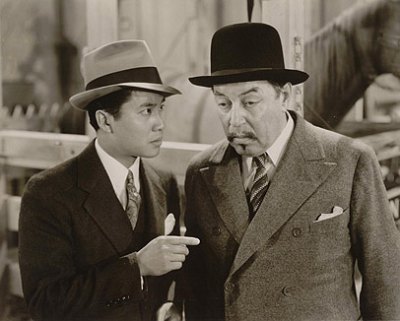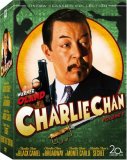| Reviews & Columns |
|
Reviews DVD TV on DVD Blu-ray 4K UHD International DVDs In Theaters Reviews by Studio Video Games Features Collector Series DVDs Easter Egg Database Interviews DVD Talk Radio Feature Articles Columns Anime Talk DVD Savant Horror DVDs The M.O.D. Squad Art House HD Talk Silent DVD
|
DVD Talk Forum |
|
|
| Resources |
|
DVD Price Search Customer Service #'s RCE Info Links |
|
Columns
|
|
|
Charlie Chan - Volume 3 (The Black Camel / Charlie Chan's Secret / Charlie Chan on Broadway / Charlie Chan at Monte Carlo)
"Always harder to keep murder secret than for egg to bounce on sidewalk."
The Black Camel (1931)
Long unavailable, for years this was probably the most difficult of surviving Charlie Chan movies to see; even bootleg versions of the film were so bad it was hard to tell just what was going on. Though the film, like most of the others, is preceded with the ominous warning that the film is being presented "using the best source material available," in fact The Black Camel looks splendid throughout. There's one reel that's a wee bit more scratched up than the others, but overall it looks just great.
The picture was Oland's second outing as Chan. The first, Charlie Chan Carries On (also 1931), doesn't survive, though Fox did release Eran Trece ("There Were 13"), the Spanish-language version shot simultaneously with a Hispanic cast, in the Volume 2 set. Though Manuel Arbo wasn't very good as Charlie Chan, if you squint real hard you can get a good sense what the English version with Oland must have been. It's not a bad little mystery, but The Black Camel is a big step up.
Set on Chan's home turf of Hawaii - and, significantly, filmed on location there - early scenes follow Hollywood star Shelah Fane (Dorothy Revier), herself on location for a movie. She's in love with globetrotter Alan Jaynes (William Post Jr.), whom she met on the boat from Los Angeles but, uncertain about their relationship, sends for alleged mystic Tarneverro (Bela Lugosi) for advice about their proposed marriage.
Shelah, it seems, was three years before in love with an actor named Denny Mayo, and is linked somehow to his mysterious and as yet unsolved murder. Shelah herself is murdered, stabbed through the heart, soon after consulting with Tarneverro, her body discovered by Shelah's friend Julie (Sally Eilers) and her new boyfriend, island publicity director Jimmy Bradshaw (24-year-old Robert Young, in his official screen debut).
Charlie Chan (Oland) and his hyperactive Japanese assistant, Kashimo (Otto Yamaoka), are soon on the case interviewing suspects, which also include Shelah's maid, Anna (Violet Dunn) and butler Jessop (Dwight Frye).
The use of actual Hawaiian locations and, especially, director Hamilton McFadden's imaginative and (by early talkie standards) mobile camerawork is very impressive. (McFadden also plays the part of the movie director in The Black Camel.) Looking at it now, the picture's footage of Hawaii is of enormous historical interest; it's fascinating to see the future state long before it was choked with high-rise buildings. The Royal Hawaiian Hotel, featured prominently, was built in 1927 and still exists, though to say the land around it has since been developed would be an understatement.
The mystery aspects, co-adapted by the acclaimed screenwriter Dudley Nichols, are above average and Lugosi's scenes with Oland are a delight. Fresh from the film version of Dracula (as was unbilled actor Frye), Lugosi's phony psychic likens his trade's powers of observation to that of Chan's, and the two have great chemistry together. It's a shame Lugosi wasn't brought back for later Chan pictures.
The almost spastic Kashimo (an inauthentic Japanese name) was a carryover from the Earl Derr Biggers novel, and is clearly an antecedent for Keye Luke's impetuous "Number One Son," Lee Chan. But where Lee would be handsome, likeable and intelligent if overly enthusiastic, Kashimo is an odd, almost-Asian stereotype: hyperactive as a weasel, he's mostly a thorn in Chan's side, throughout the picture bursting onto the scene announcing, "Clue!" It's the type of characterization usually assigned to Chinese domestic types, like Victor Wong's Charlie the Cook in King Kong and its sequel, rather than Japanese characters. There is the subtlest suggestion of strained Sino-Japanese relations in the scenes between Chan and Kashimo (the Mukden Incident occurring soon after The Black Camel's release), but mostly Kashimo's there for simple comedy relief.
A more welcomed comic presence is an unbilled Marjorie White as yet another suspect, Rita Ballou. The diminutive, perky blonde did few films, but is remembered as the star of the Three Stooges first Columbia short, Woman Haters (performed entirely in verse), released shortly before her death in 1935 road accident.
"Most fortunate gift to be able to cross bridge to dwelling place of honorable ancestors before arriving."
Charlie Chan's Secret (1936)
Wedged between the "in" films (Charlie Chan in Egypt, Charlie Chan in London, Charlie Chan in Shanghai) and the "at" pictures (Charlie Chan at the Circus, ...at the Opera, ...at the Race Track), each set having its own distinct personality, Charlie Chan's Secret is an old-fashioned but very enjoyable and effective mystery, even though it seems much older than it actually is. Its static direction and Old Dark House setting are more like something from early in the decade.
A man claiming to be Allen Colby, long-lost heir to a family fortune, is en route to San Francisco when his boat is lost off the shores of Hawaii. Assisting in the search and recovery effort, Charlie Chan finds evidence that an attempt had been made on Colby's life, and though his body is not recovered, Chan believes Colby somehow survived.
Later, in San Francisco, Charlie reports his findings to no-nonsense matriarch Henrietta Lowell (Henrietta Crosman), Allen's aunt, whose family - as well as the family's attorney (Jonathan Hale), a psychic "investigator" (Arthur Edmund Carew) and his medium, Carlotta (Gloria Roy), whose "research" Henrietta funds, have all benefited financially from Allen's disappearance - and who all stand to lose everything if he claims his fortune now.
Meanwhile, Allen (Jerry Miley) makes his way to the nearby Colby House which, with its crooked, dead trees, gargoyles, secret panels, and a black cat named Lucifer, is more like Castle Frankenstein than anything in San Francisco. Allen doesn't get to enjoy his newfound wealth, however: he's stabbed in the back. Casually examining the fully-clothed body on the floor, the coroner announces, "The knife passed through the right ventricle of the heart." He must have X-ray vision.
Later, at a seance conducted by Carlotta at Henrietta's insistence, Allen's body suddenly emerges from the darkness frightening everyone, especially butler, Baxter (Herbert Mundin), out of their wits. Although son Lee is mentioned several times, his absence is sorely felt, and Mundin's comic butler is more annoying than funny.
Though it lacks the exotic locales of earlier entries and the breezier tone of the later Olands, Charlie Chan's Secret is quite enjoyable on its own terms, with several good shocks (this and Egypt come closest to emulating '30s horror cinema) while its title "secret" is effectively played out even though mystery fans will easily be able to guess what's going on long before the supporting cast does.
"New York English too baffling for humble detective"
Charlie Chan on Broadway (1937)
Oland's penultimate film is a delight, an engaging mystery that captures the one of the key ingredients for the best Chans at their peak - the relationship between the stoic detective and his very Americanized son Lee. Keye Luke had only been playing the part of Lee Chan since 1935's Charlie Chan in Paris, but the character and Luke's performance made the already terrific series substantially better. The Guangzhou-born Luke and Oland, born in Sweden, looked nothing alike and yet theirs was one of the most convincing and endearing father-son relationships in the history of the movies.
Perhaps out of loyalty to his former co-star, Luke left the Chan series after Oland's death, and subsequent films starring Sidney Toler as Charlie Chan introduced other Asian actors as various younger sons, but none quite had Luke's great charm, nor could Toler quite convey that subtle mix of irritation and affection Oland's Chan had for his sleuthing offspring.
The film opens with Charlie and Lee aboard an ocean liner bound for New York, returning, perhaps from their previous case in Germany, as dramatized in Charlie Chan at the Olympics. In that film they had round-trip tickets aboard the Hindenburg but, well, that didn't work out so well. Thomas Mitchell [!] (Marc Lawrence) breaks into the cabin next-door, obviously searching for something, but its occupant, beautiful Billie Bronson (Louise Henry), refuses to report the crime to the ship's purser. Later, Billie hides a mysterious package among the Chan's belongings (without their knowledge) for safekeeping.
(Mild Spoilers) Billie, it turns out, had been subpoenaed to testify before a grand jury on a racketeering case. She fled the country, and after a year abroad has come back armed with a diary with far-reaching incriminations. In New York, everyone is after the diary including New York Bulletin editor Murdock (J. Edward Bromberg) and ace reporter Speed Patten (Donald Woods), shady Hottentot nightclub owner Johnny Burke (Douglas Fowley) and his crime-boss superior, Buzz Moran (Leon Ames).
Billie turns up dead in Burke's office, shot through the heart, and yet another remarkably observant medical examiner is on the scene: Casually examining the (once again) fully-clothed body on the floor, the coroner (William Jeffrey) declares, "The bullet passed through the right ventricle." The killers in these Chan films sure have good aim.
With the package hidden in Charlie Chan and Lee's stateroom, and later at their Manhattan hotel, the detective and his son join Chief Inspector James Nelson's (Harold Huber) investigation while Lee, snooping around the Hottentot, peering through keyholes, becomes a suspect at one point.
Where The Black Camel and Charlie Chan's Secret belong to an earlier era of stagy, talking head mysteries with roots in the legitimate stage and the early days of talking pictures, Charlie Chan on Broadway is in line with the post-Fox/20th Century merger and its new policy of slicker, high-end B-pictures top-heavy with genre veterans. These Chans were cheap compared to Fox's top productions, but had a polish that in the mystery genre of the 1930s was second-to-none.
After several gimmicky entries (Charlie Chan at the Olympics, ...at the Opera, ...the Circus, etc.), Charlie Chan on Broadway is a welcome return to a more straightforward murder mystery, albeit one overpopulated with Front Page reporter types relaying the latest news on the "moider" investigation. As with other recent Chans, Charlie Chan on Broadway introduces a gee-whiz new technology, in this case a paraffin gunpowder test used to exonerate one of the suspects.
Besides the terrific performances of Oland and Luke, the film is populated with the usual roster of great character players, most under contract to Fox, many of whom would turn up in other Charlie Chan and Mr. Moto films: Bromberg, Fowley, Ames, Huber, et. al. Lon Chaney Jr. turns up in a bit part, and Toshia Mori is a delight as the latest of Lee's girlfriends. Many of these Asian actresses (Shia Jung in Charlie Chan at the Circus being another especially memorable one), like Keye Luke, were really good in these films, but except for the Chan and Mr. Moto movies, Hollywood rarely gave them a chance to play anything other than Asian stereotypes. Those who attack the Charlie Chan movies as racist would do well to look at these films again. In these later Oland pictures, Keye Luke and his various onscreen girlfriends make fun, sexy, and flirtatious couples in a way rarely seen in mainstream movies even today.
"Fortunately, assassination of French language not serious crime"
Charlie Chan at Monte Carlo (1938)
Warner Oland's last completed Charlie Chan movie finds the character in the swank, pre-To Catch a Thief/Grace Kelly country of Monaco, or at least a Fox backlot imagined recreation. The story concerns $1,000,000 worth of metallurgic bonds that turn up missing after a bank messenger employed by Victor Karnoff (Sidney Blackmer) is found dead en route, by none other than Charlie Chan and son Lee (Keye Luke), themselves stranded after their own taxi broke down.
Aiding local inspector Jules Jobert (the impressively versatile Harold Huber, who surprisingly was fluent in French), Charlie and Lee question various suspects, including Evelyn Grey (Virginia Field), whose roadster was spotted speeding away from the crime scene; her lover Paul Savarin (Edward Raquello), Karnoff's stockbroker rival; Joan Karnoff (Kay Linaker, later famous for writing the script to The Blob!), Victor's wife, who is being blackmailed by bartender Al Rogers (George Lynn); and Victor's loyal secretary, Gordon Chase (Robert Kent).
There's not much to say about Charlie Chan at Monte Carlo. The mystery aspects are not very compelling; few of the suspects are sympathetic or interesting, and the case itself is both dull and convoluted. As he was in several earlier entries, Huber's flamboyant characterization makes a good counterpoint to Oland's stoic one, but the mystery itself is uninteresting and alert viewers will easily be able to guess the killer's identity with relative ease.
Friend and big-time Charlie Chan fan Sergei Hasenecz cautioned this reviewer about Oland's appearance, that he was so sick by this time (largely on account of his accelerated alcoholism) that you could even see his hands shaking in some shots, but I didn't notice this. He is more than a little stiff but Oland was heading in that direction with the character for some time anyway; viewers not aware that he'd be dead within a few months of this production probably wouldn't suspect anything was wrong with the actor's health.
The film's saving grace, once again, are Oland's delightful scenes with actor Keye Luke. Language and cultural differences were always a big part of the series at this time; Oland himself convincingly delivers a long speech in Mandarin in one of the films, and here Luke is very believable as a wide-eyed tourist trying to speak French as much as possible, but not well enough to avoid several major misunderstandings. These scenes are both very funny yet linguistically realistic, and Oland's sardonic reactions to Luke's mangling of the French language are priceless. In one such scene, Charlie wants to order waffles for breakfast, but Lee knows only the French words for bacon and eggs. After Lee unsuccessfully tries to place his father's order, Chan draws the waiter a picture: "Action speak louder than French," he says, but the waiter misinterprets the grid-like drawing, and instead brings Charlie a book of crossword puzzles!
Video & Audio
All but one of the Chan films are preceded with apologies about the lack of good film elements, but all five features (see below for information on Behind That Curtain) look just fine, some better than others, but even the weaker ones are superior to many other major label releases of '30s catalog titles. For instance, Warner Home Video's RKO Tarzans and Val Lewton movies don't look nearly as good as the weakest of these.
The Black Camel is pre-20th Century-Fox but nonetheless is preceded by the later company logo, which may suggest this was derived from a reissue version. As mentioned above, the film looks great. The only potential issue is an odd jump cut when Julie and Jimmy find Shelah's body. If a reissue version was sourced, its possible the pre-Code film may have lost a shot or two of Shelah's body, but this is pure speculation.
Charlie Chan's Secret has a strange flaw with the audio, a weird if faint echo effect, much like going to the multiplex and being able to hear the movie playing next door. The movies are in adequate English mono only, with optional English, French, and Spanish subtitles. These subtitles are not carried over into the extra features.
Extra Features
As with Fox's other mystery series sets, Charlie Chan Volume 3 is chock-full of supplements. The most significant of these is Behind that Curtain (1929) the first Fox-produced Chan film, though the character doesn't appear until the last 20 minutes or so, and when he does Chan (Asian actor E.L. Park) has neither much to do nor does he resemble Oland's later characterization. Despite this and the static, primitive nature of most early talkies (everyone...talks...very...slowly, the actors careful stop not step on their fellow actors' lines), I found the film to be nearly as entertaining as the other Chan films, albeit on its own terms. Star Warner Baxter (42nd Street, Prisoner of Shark Island) is very good, and the picture has the same sort of globe-trotting appeal and other elements associated with the Chan films, it's just that here Sir Frederic Bruce (Gilbert Emory) of Scotland Yard does most of the leg work. The print sourced is also quite good and, per Fox's early sound process, is correctly formatted to its original aspect ratio of 1.33:1, with modest black bars on the sides of the image.
Charlie Chan expert Ken Hanke and John Cork, the producer of the Chan series featurettes, provide audio commentaries for The Black Camel and Charlie Chan's Secret. There's some good information here and there, but mostly they play more as appreciations than critical analyses (like most of Criterion's DVDs) nor are they the information-crammed commentaries associated wth Cork's excellent Bond series titles.
Charlie Chan's Chance is a recreation, using production stills, of one of the four Oland Chans that have been lost, possibly for good. The recreation is more in the style of a radio drama than a Ron Haver-type A Star Is Born reconstruction, but the obvious effort and affection is there. Unless a copy of the film turns up, this isn't a bad way approximation.
Charlie Chan and the Rise of the Modern Detective does a pretty good job putting Charlie Chan into perspective, tracing the influence of 19th century writers like Edgar Allan Poe. Curiously, the featurette either barely mentions or ignores altogether the influence of Sir Arthur Conan Doyle and Agatha Christie and their respective crime-solvers. Dr. Henry Lee: The Modern Day Charlie Chan profiles a man whose career in many ways has mirrored that of Earl Derr Biggers' hero; he also defends the films against attacks by well-meaning but largely misguided anti-defamation groups.
The World of Charlie Chan lines up an impressive list of historical and cultural experts to put the settings of the Oland Chans into context. Some of this plays like filler, but the material on Charlie Chan at the Olympics and a few other titles is especially interesting. Chanograms: The Aphorisms of Charlie Chan is an affection look at exactly that.
Charlie Chan is Missing: The Last Days of Warner Oland is a mini-biographical sketch of Oland's early life and final days. It's very informative if a little sad. Kay Linaker (Charlie Chan at Monte Carlo) is among the interviewees; I only wish there was more of her. Warner Oland is Charlie Chan is a strong collection of advertising material from the Oland years. Each title also includes an impressive still gallery and interesting restoration comparison.
Parting Thoughts
After years of skittishness on Fox's part over the series' alleged Asian stereotypes*, Fox's commendably careful and appropriate handling should once and for all put this issue to rest. The films look great, the extras are good-to-excellent, and one only hopes the label will continue with this approach with its Sidney Toler Chans and its other mystery series. A DVD Talk Collectors Series title.
"Thank you so much, Warner Oland"
Note: This reviewer is indebted to the wonderful website The Charlie Chan Family Home, a great resource.
* As someone living in an Asian country married to an Asian woman, I don't find Oland's characterization remotely offensive. Chan, after all, is smarter, wiser and infinitely more polite than anyone else in these films, while Number One Son Lee is breezily likeable and at times even heroic. If they're stereotypes, they're resolutely positive ones.
Film historian Stuart Galbraith IV's most recent essays appear in Criterion's three-disc Seven Samurai DVD and BCI Eclipse's The Quiet Duel. His audio commentary for Invasion of Astro Monster is now available.
|
| Popular Reviews |
| Sponsored Links |
|
|
| Sponsored Links |
|
|
| Release List | Reviews | Shop | Newsletter | Forum | DVD Giveaways | Blu-Ray | Advertise |
|
Copyright 2024 DVDTalk.com All Rights Reserved. Legal Info, Privacy Policy, Terms of Use,
Manage Preferences,
Your Privacy Choices | |||||||









